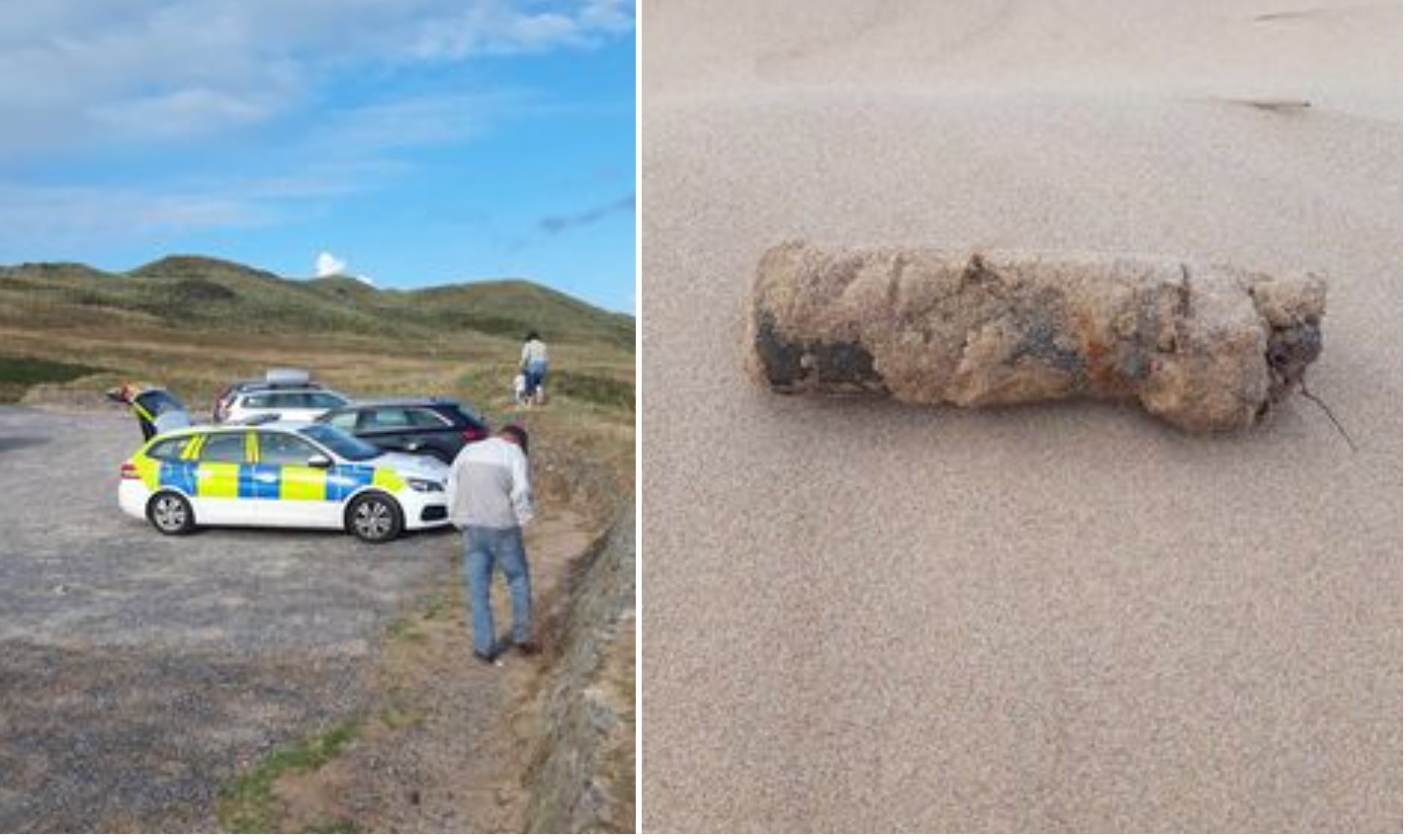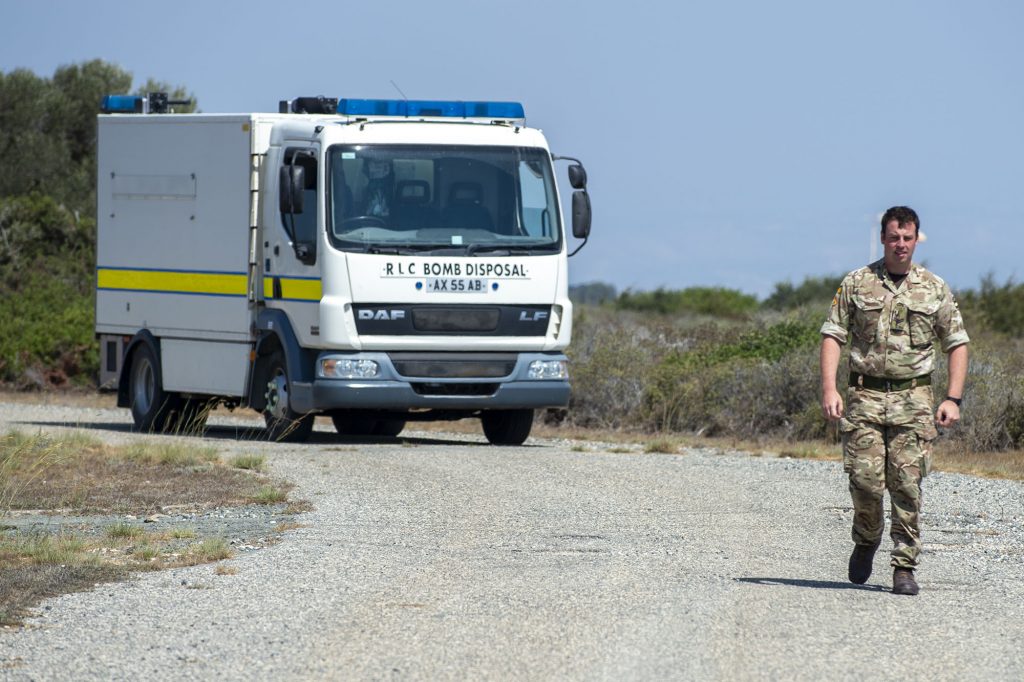News
Unexploded ordinance found at Freshwater West beach

A MAN out metal detecting came across unexploded ordinance at Freshwater West beach last Sunday (Jul 16).
Police were quickly called and attended to make the scene safe and later, a RLC Bomb Disposal team were later, The Herald Understands, to perform a controlled explosion.
The RLC (Royal Logistic Corps) is a branch of the British Army responsible for a variety of logistical support tasks, including bomb disposal and dealing with unexploded ordnance (UXO). They are trained in specialised techniques to defuse and neutralise explosive devices, ensuring the safety of civilians and military personnel.
Summary of RLC Bomb Disposal and UXO Operations:
- Detection and Assessment: The process typically begins with the identification of a suspicious device or UXO. This can occur through various means, such as reports from civilians, military personnel, or during clearance operations after a conflict.
- Isolation and Evacuation: The area around the device or UXO is immediately secured, and a safe perimeter is established to prevent unauthorised access. If necessary, nearby civilians are evacuated to a safe distance to minimise potential casualties in case of accidental detonation.
- Render Safe Procedure (RSP): The bomb disposal team, which consists of highly trained and experienced personnel, approaches the device with great caution. They use specialised tools and equipment to assess the type of explosive, its condition, and potential triggering mechanisms.
- Remote Techniques: When possible, bomb disposal experts utilise remote techniques, such as robots or drones, to inspect and handle the device from a safe distance. This minimises the risk to human life during the process.
- Disposal Techniques: The RLC employs various techniques to disarm the bomb or make it safe for transportation. These may include cutting wires, removing detonators, or neutralising the explosive material using controlled detonations.
- Controlled Detonation: In cases where it is deemed too risky or not feasible to disarm the device, a controlled detonation may be conducted in a controlled environment. This involves using additional explosives to render the original device harmless.
- Safe Transport and Storage: If the device cannot be safely neutralised on-site, it is carefully transported to a secure location for disposal or further analysis.
- Documentation and Analysis: After the operation, the RLC team documents their findings and procedures for further analysis and to improve their techniques for future operations.
Throughout the entire process, safety is the utmost priority, and the bomb disposal experts follow strict protocols and guidelines to minimise risks and ensure the successful neutralisation of the explosive threat. These operations require highly specialised training, equipment, and nerves of steel to handle the potentially life-threatening situations they face.

News
Paris in February made easy with special direct Air France flights from Cardiff

TRAVELLING to Paris has never been simpler for Welsh holidaymakers, with Air France launching a series of special direct weekend services from Cardiff Airport to the French capital this month.
The limited-period flights offer a convenient, non-stop journey of under two hours to Paris, giving passengers more time to enjoy the city’s culture, cuisine and famous landmarks without the hassle of connections or long road transfers to other UK airports.

Timed perfectly for winter city breaks and Valentine’s getaways, the services run between February 13 and February 16, making them ideal for long weekends.
February is widely considered one of the best times to visit the French capital, with fewer crowds and a relaxed, romantic atmosphere. Visitors can explore world-famous attractions including the Eiffel Tower, the Arc de Triomphe and Notre-Dame Cathedral, browse galleries at the Louvre and Musée d’Orsay, or simply enjoy cafés, bistros and Michelin-starred dining across the city.
With Valentine’s Day falling during the operating period, the flights offer couples an easy escape for scenic walks along the Seine, memorable meals and classic Parisian experiences.
Jon Bridge, CEO of Cardiff Airport, said: “We’re delighted to offer direct flights to such a vibrant city for Valentine’s weekend. Cardiff Airport is expanding its reach, giving customers an easy, friendly travel experience and fantastic options. We’ve listened to passenger demand and are excited to make this opportunity possible, with more to come from Cardiff.”
Seats are available now via airfrance.co.uk and through travel agents. As availability is limited, early booking is recommended.
Flight schedule
Cardiff (CWL) to Paris (CDG)
• Feb 13 – AF4149 – 6:20pm → 8:50pm
• Feb 14 – AF4149 – 3:20pm → 5:50pm
• Feb 15 – AF4149 – 9:20am → 11:50am
• Feb 15 – AF4151 – 9:00pm → 11:30pm
• Feb 16 – AF4149 – 9:20am → 11:50am
• Feb 16 – AF4151 – 5:50pm → 8:20pm
Paris (CDG) to Cardiff (CWL)
• Feb 13 – AF4148 – 5:00pm → 5:30pm
• Feb 14 – AF4148 – 2:00pm → 2:30pm
• Feb 15 – AF4148 – 8:00am → 8:30am
• Feb 15 – AF4150 – 7:40pm → 8:10pm
• Feb 16 – AF4148 – 8:00am → 8:30am
• Feb 16 – AF4150 – 4:30pm → 5:00pm
Education
Language commissioner launches probe into school closure impact on Welsh

THE WELSH Language Commissioner has launched a formal investigation into claims that the proposed closure of a rural Carmarthenshire primary school did not properly assess the impact on the Welsh language.
Campaign group Cymdeithas yr Iaith confirmed this week that the Welsh Language Commissioner will examine whether Carmarthenshire County Council complied with its legal duties when producing a language impact assessment linked to plans to close Ysgol Llansteffan.
The council issued a statutory notice last year proposing to shut the village school at the end of the summer term as part of wider education reorganisation. A final decision had been expected this spring.
However, the investigation now creates fresh uncertainty over the timetable.

Complaint over ‘insufficient assessment’
Cymdeithas yr Iaith says it submitted a formal complaint arguing that the council failed to produce a sufficiently detailed assessment of how the closure could affect Welsh-medium education and the wider Welsh-speaking community.
The group claims the authority selectively used data to support closure rather than examining all available evidence objectively.
Two key concerns were raised.
Firstly, campaigners argue there may not be enough places in neighbouring Welsh-medium schools to accommodate pupils from Llansteffan and nearby housing developments, potentially forcing some families into English-medium provision.
Secondly, they say the assessment did not meaningfully consider the school’s role as a community hub or explore ways the site could generate income and support local Welsh-language activities.
On behalf of local members, Ffred Ffransis said: “There will not be places for all the Llansteffan children, nor for the children of the new housing estates, in other Welsh-medium schools in the area.
“The most cost-effective way of providing sufficient places locally in Welsh-medium education is by keeping open Ysgol Llansteffan and making better use of the buildings, including environmental education and community use.”
Formal investigation
In a letter to the group, the commissioner confirmed an investigation will be held under Section 71 of the Welsh Language Measure to determine whether the council complied with Welsh language standards.
The probe could take up to three months.
Campaigners believe this may delay implementation of the closure and could require the council to revisit its assessment and potentially carry out a fresh statutory consultation.
Ffransis said: “Even if the council now decided to make a full and meaningful assessment, there would likely have to be a new consultation. The original decision may have been taken on a faulty basis.”
He added that similar concerns had been raised about language impact assessments connected to other proposed school closures in the county.
Council position
The council has previously said that school reorganisation proposals are driven by falling pupil numbers, financial pressures and the need to ensure sustainable, high-quality education.
Authorities across Wales have faced difficult decisions in recent years as rural rolls decline and building maintenance costs rise.
It is expected the council will respond formally to the commissioner’s investigation in due course.
What happens next
If the commissioner finds that language standards were not properly followed, enforcement steps could be taken and the process delayed or revisited.
For families in Llansteffan, the outcome may determine whether their local Welsh-medium school remains open beyond the summer term.
The Herald has contacted Carmarthenshire County Council for comment.
Further updates will follow as the investigation progresses.
Business
First Minister criticised after ‘Netflix’ comment on struggling high streets

Government announces 15% support package but campaigners say costs still crushing hospitality
PUBS, cafés and restaurants across Wales will receive extra business rates relief — but ministers are facing criticism after comments suggesting people staying home watching Netflix are partly to blame for struggling high streets.
The Welsh Government has announced a 15% business rates discount for around 4,400 hospitality businesses in 2026-27, backed by up to £8 million in funding.
Announcing the package, Welsh Government Finance Secretary Mark Drakeford said: “Pubs, restaurants, cafés, bars, and live music venues are at the heart of communities across Wales. We know they are facing real pressures, from rising costs to changing consumer habits.
“This additional support will help around 4,400 businesses as they adapt to these challenges.”
The announcement came hours after Eluned Morgan suggested in Senedd discussions that changing lifestyles — including more time spent at home on streaming services — were contributing to falling footfall in town centres.
The remarks prompted political backlash.
Leader of the Welsh Liberal Democrats, Jane Dodds, said: “People are not willingly choosing Netflix over the high street. They are being forced indoors because prices keep rising and wages are not.
“Blaming people for staying at home is an insult to business owners who are working longer hours just to survive.”
Industry groups say the problem runs deeper than consumer behaviour.
The Campaign for Real Ale (CAMRA) welcomed the discount but warned it would not prevent closures.
Chris Charters, CAMRA Wales director, said: “15% off for a year is only the start. It won’t fix the unfair business rates system our pubs are being crushed by.
“Welsh publicans need a permanent solution, or doors will continue to close.”
Across Pembrokeshire, traders have repeatedly told The Herald that rising energy bills, wage pressures and rates — rather than a lack of willingness to go out — are keeping customers away.
Several town centres have seen growing numbers of empty units over the past year, with independent shops and hospitality venues reporting reduced footfall outside the main tourist season.
While ministers say the relief balances support with tight public finances, business groups are calling for wider and longer-term reform.
Further debate on rates changes is expected later this year.

-

 Health6 days ago
Health6 days agoConsultation reveals lack of public trust in health board
-

 News7 days ago
News7 days agoCaldey still unsafe, survivors warn — despite Abbey’s reform claims
-

 Community7 days ago
Community7 days agoPembrokeshire students speak at national Holocaust Memorial Day event
-

 News19 hours ago
News19 hours agoPrincess of Wales visits historic Pembrokeshire woollen mill
-

 News7 days ago
News7 days agoKurtz raises Gumfreston flooding in the Senedd as petition deadline nears
-

 Crime5 days ago
Crime5 days agoPembroke man accused of child sex offences sent to Swansea Crown Court
-

 Education7 days ago
Education7 days ago‘Vulnerable teen’ questioned by police at Milford Haven School
-

 Education7 days ago
Education7 days agoAttendance concerns at Milford School reflect wider issue raised at the Senedd



























